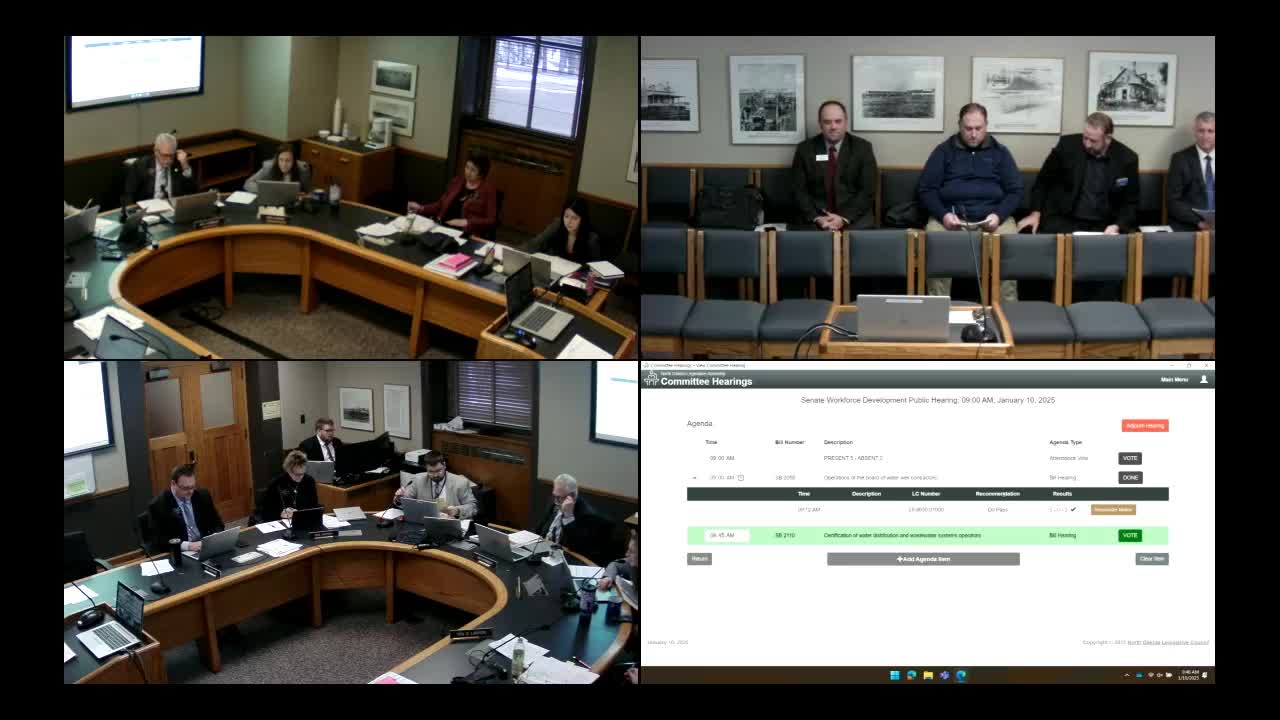DEQ proposes testing, fee and penalty changes for water system operators; committee hears concerns about enforcement process
Get AI-powered insights, summaries, and transcripts
Subscribe
Summary
The Senate Workforce Development Committee heard testimony on Senate Bill 2110, which would allow third‑party testing for water and wastewater operator certification, move the certification year to Jan. 1, authorize exam fees to be set in administrative code and permit civil penalties up to $5,000 per day for violations.
The Senate Workforce Development Committee heard testimony on Senate Bill 2110, a measure from the Department of Environmental Quality (DEQ) that would change how operators of public drinking water and wastewater systems are certified and how violations are penalized.
DEQ Director of the Division of Municipal Facilities David Brushwein told the committee the bill makes four principal changes: move the operator certification year from July 1 to Jan. 1 to align with the calendar year; allow the DEQ to use a third‑party testing service for operator exams; permit operator testing fees to be set in administrative code; and authorize civil penalties of up to $5,000 per day for violations of the chapter, while reserving a criminal penalty for intentional or willful misconduct.
"The use of a proctored site is very desirable for small system operators who would be able to take an exam at a time of their choosing instead of being limited to the monthly testing date," Brushwein said, describing stakeholder requests that prompted the bill.
Committee members pressed DEQ witnesses on when and how civil penalties would be assessed. Senator Larson asked whether the department could immediately assess a per‑day fine or whether a formal determination was required. Eric Walton, counsel to DEQ from the Assistant Attorney General’s Office, said the statutory language establishes a maximum daily civil penalty but that the department’s enforcement ordinarily follows steps: informal compliance efforts, a notice of violation, then formal administrative complaint and hearing under the Administrative Procedures Act if necessary. He said the department has used criminal enforcement in the past for deliberate submission of false test results, and that an administrative law judge (ALJ) or district court would typically be required to order the maximum daily penalty; the ALJ could order a lesser amount.
Representatives of water utilities and associations supported the bill but acknowledged questions about the fee and penalty details. Eric Volk, executive director of North Dakota Rural Water, said the proposed third‑party testing administrator would likely increase per‑exam costs above the current $50 testing fee and that the state’s operator certification reimbursement program helps small systems (for systems serving 3,300 or fewer people) cover testing costs. Matt Gardner, introduced as executive director for the North Coteague Cities, also supported the changes and emphasized workforce shortages for certified operators in many communities.
Witnesses and counsel said the civil penalty provision mirrors language used elsewhere in environmental code (air quality, hazardous waste) and that the $5,000 per‑day figure is a statutory cap intended to be applied proportionally; DEQ representatives said they rarely seek the maximum and that proposed penalties would generally be scaled to the size and circumstances of the system. Several senators requested clearer statutory language or guidance on when civil enforcement would be used versus informal compliance efforts.
No final committee vote occurred on SB 2110. After testimony and questioning the committee recessed and indicated it would "sit on this one a little bit," then closed the hearing. No amendments or committee actions were adopted at the hearing.
